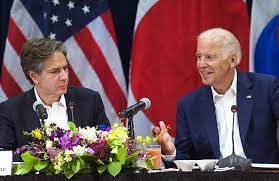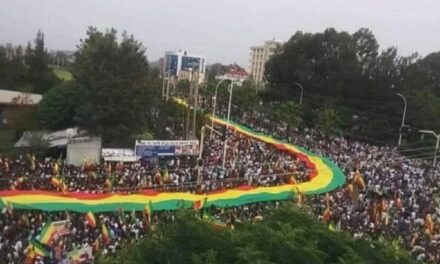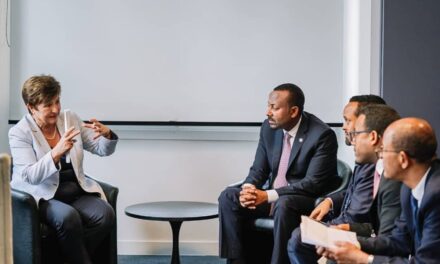By: Zerihun Tesfaye
Recently, United States strategic orientation and foreign policy objectives with regards to the Horn of Africa and the Red Sea region have shifted significantly. As a result of such changes, US-Ethiopia relations now face a historic turbulent period.
But this is not quite an isolated international political incident of sorts. Here is why. Despite the candidate Biden’s pronouncements during his campaign for president, currently, it has also become the stated objective of the Biden Administration to challenge and confront China on all fronts. It is a stated position, that both Secretary Blinken and NSC Advisor Sullivan consider China as the greatest long-term national security threat to the US.
With this challenge and confrontation in mind, the robust relationship between Ethiopia and China is considered by the US Foreign Policy establishment, as a weak link to be exploited with some sense of urgency to use it as a test case. This, they believe could be readily accomplished, because the crisis created by the TPLF attack against the Ethiopian National Defense forces, and the resultant war which created a humanitarian crisis and undue burden on the politics and economy of the country, has created a window of opportunity they should not squander.
To complicate things further, personalities close to the TPLF throughout the years it was in power who happen to currently work within the Biden Administration, and their circle of friends outside government, and elements in academia that had close affinity with the group, and their vociferous anti-Ethiopia campaign in an effort to resuscitate the group, has further muddied the relationship between Ethiopia and the US more than the reality on the ground dictates.
These above three elements are what seem to animate US policy towards Ethiopia, and whatever the Ethiopian government does or doesn’t do would not change the US’s current attitude.
Seemingly caught unprepared at the level of hostility targeting Ethiopia by the new Biden administration, the Ethiopian government initially wasn’t quick to respond to the very many unsubstantiated allegations and unfounded attacks against it.
However, even when a coherent and fact-based response was provided by the Ethiopian government, and some of its concerns addressed, the Biden administration kept ratcheting up the rhetoric and kept moving the goal post; thus, making it clear that the new US posture towards Ethiopia and the region at large had mostly (if at all) nothing to do with the crisis in Tigray, but everything to do with its changed policy and attitude towards Ethiopia.
Looking back, maybe one should have noticed the new US Administration might have a different agenda by referring to statements made by Anthony Blinken, the current Secretary of State, on his twitter feed a couple of months before he was confirmed. (An interesting parallel could be drawn with the ‘grand strategy’ drafted by neoconservatives in 1989-92 who were able to have it implemented by George Bush using September 2001 as an excuse to invade Iraq)
” Deeply concerned about the humanitarian crisis in Ethiopia, reports of targeted ethnic violence, and the risk to regional peace and security. The TPLF and Ethiopian authorities should take urgent steps to end the conflict, enable humanitarian access, and protect civilians.”
Statements of this nature started coming out from others, like Jake Sullivan the pick for National Security Advisor who said;
“I’m deeply concerned about the risk of violence against civilians, including potential war crimes, in the fighting around Mekelle in Ethiopia. Civilians must be protected and humanitarian access must be opened. Both sides should immediately begin dialogue facilitated by the AU.” (Emphasis mine)
Ignoring what Secretary Nagy warned, about creating false equivalency between the Ethiopian Government and the rogue elements of TPLF who were the culprits of the unprovoked military attack.
.
Once confirmed to their nominated posts, the newly minted group in the Sate Department and at the National Security Advisors office went head on instituting policies that completely changed the previously stated positions of the US Government, and started putting undue pressure on the Ethiopian government, which keeps escalating.
To understand how the current crisis in Tigray is being used as a ruse by the current US Administration, I will briefly outline the background.
Some Background to the current crisis
In the dead of night on November 3, 2020, organized, coordinated and directed by the higher echelon of the TPLF leadership, a murderous attack killing hundreds and holding thousands as hostages was unleashed against members of the Ethiopian National Defense Forces who were stationed on several fronts in the Tigray region. Such betrayal by a regional force against its own National army is indeed unprecedented.
The next day, instead of showing remorse, or at least be ashamed by their dastardly act and betrayal of their colleagues and the nation, leaders of the TPLF went on the regional airwaves and television, bragging about the ‘blitzkrieg’ attack they conducted and the herculean feat they accomplished in a very short time frame. In the words of Debretsion, head of TPLF and the region ‘we have accomplished chapter one with complete success and are ready to embark onto the second chapter’, and even threatening to use long-range missiles he claimed to be part of his Special Forces arsenal to hit Addis Ababa, some of which was used to attack Bahir Dar & Gondar airports and the neighboring State of Eritrea’s capital Asmara.
The TPLF leadership went on further, and put the Federal Government on notice, to not even dare attempt to reverse the situation, lest it face the fate of the Northern Command.
Faced with this dangerous reality that put the country’s territorial integrity in jeopardy, the Federal Government had no option but to mobilize its remaining forces from all over the country including units assigned for peace keeping operations abroad and regional militias to protect the nation and put down this rebellion that could undermine the nation’s wellbeing and integrity.
This brazen attack on the Ethiopian National Defense Forces and endangerment of the nation’s integrity was roundly condemned by most nations around the world including the United States. The Federal Government’s measures to reverse it were endorsed by all the regional governments and the Federal Parliament, but more importantly whole heartedly supported by the great majority of the Ethiopian people, thus assuring its successful outcome.
US response to TPLF attacks on the Ethiopian National Defense Forces
When these events took place in November of 2020, the then Assistant Secretary of State for African Affairs Tibor Nagy knew what took place and acted accordingly, and in no uncertain terms. This not only with regards to the TPLF’s attack of the Ethiopian National Defense Forces, and TPLF militia’s massacring of civilians in Mai-Kadra, but also its unprovoked missile attack against the neighboring Eritrean State and its effort to internationalize the crisis.

Trying to understand the motivation behind TPLF’s attack against the Northern Command, Asst. Secretary Nagy had this to say in a briefing at the State Department on November 19, 2020.
“I mean, again, difficult to tell motivation, but it seems like they were doing this more to depose the prime minister from power and to reassert themselves into the prominent position that they had atop the Ethiopian political spectrum for the last 27 years”
He went on further to say, ‘But again, I want to make it very clear that this is not about Tigray. There is no equivalency here. This is not two sovereign states fighting against each other. This is a faction of the government running a region in Ethiopia that has decided to undertake hostilities against the central government, and it has not – in my view- has had the effect that they thought they were going to get.”
This then was the general understanding and positions of the US State Department and its policy towards events in which the US saw, as Tibor Nagy put it at the time; “Ethiopia, most especially since Prime Minister Abiy has taken power, is the linchpin in the region’
Today let alone consider Ethiopia as a ‘linchpin’ of the region, the US is not even giving Ethiopia its due respect as a sovereign nation and wants to dictate terms as if it’s an appendage.
Given the US’s own history, one can does not rule out if the Administration’s behavior towards Ethiopia and its government has to do with its incredulity at the defiance shown by a poor, yet, proud black nation to its attempt at diktat; but they ought to know Ethiopia’s history.
In the end, when one sees a 180 degree change of policy direction and attitude towards Ethiopia in a matter of months, (when if anything, large scale military confrontation is ebbing and the danger caused by TPLF’s military adventure to the nation and neighboring countries has been eliminated, and its military capabilities severely degraded,) we realize that the US’s posture has very little to do with the reality on the ground and is being used as a subterfuge to advance its current agenda in the region.
It is said the hallmark of mature democracies is that policies are informed by institutional memory, and a nation’s enduring interest, and are not susceptible to the whims or capricious desires of individuals or their cronies, who happen to be leading the institutions at any given time. The reality at the US State Department and the National Security office and its attitude towards Ethiopia, forces one to wonder if it still holds true.
By now it has become abundantly clear, that as far as the US Administration is concerned, if Ethiopia’s integrity and survival is undermined in the pursuit of their stated strategic objectives in the wider region, it will not be much of a concern to them.
This being the case, it’s up to the Ethiopian people and government to safeguard the nation’s integrity and national interest from being sacrificed on the altar of the US’s newly articulated strategic objective, by holding firm the principle of independence and non-interference of others in the conduct of the nation’s affairs.
(The opinion explained in this article does not necessarily reflect EastAfricanist’s position)





